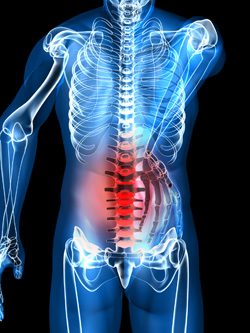SPINAL CONDITIONS
- Introduction
- Back & Neck Pain
- Disk Herniation/Sciatica
- Spinal Stenosis
- Osteoporosis/Compression Fx
- Facet Joint Arthritis
- Post-Operative Back Pain
Disk Herniation/Sciatica
Age and Degenerative Disk Disease
As people age, the nucleus pulposus may naturally dehydrate. Like a tire that loses air, its ability to absorb shock is lessened. The annulus fibrosus weakens and begins to tear. This may not cause pain in some people. In others, it may cause chronic pain, known as axial pain or disk space pain. Gradual dehydration of the nucleus pulposus is called degenerative disk disease. For more information and resources go to: http://www.spine-health.com/video/lumbar-herniated-disc-video

What is a Disk Herniation?
Herniated disks can be called by many names. A slipped disk, ruptured disk, or a bulging disk can all refer to the same medical condition.
Within the spine, a gel-like cushioned disk (nucleus pulposus) absorbs impact like a shock absorber, and separates vertebrae. When the annulus fibrosus tears due to an injury or the aging process, the nucleus pulposus can extrude through the tear. You might imagine a prolapsed disk as something like a doughnut with jelly. Applying pressure forces the nucleus pulposus to squeeze outside of the disk. This can put pressure on nerves and stimulate the symptoms of sciatica, or disk herniation.
Like a tree branching out, major spinal nerves extend out all along the spine to various organs, tissues and extremities. Herniated disks often press against these nerves. These ‘pinched nerves' cause radiating pain, numbness, tingling, and diminished strength and/or range of motion. Further, when the nerve comes in contact with the inner nuclear gel's inflammatory proteins, a person may experience significant pain. Nerve-related pain is also known as radicular pain. When the disk protrudes into surrounding vertebrae, it is called Schmorl's nodes.
Symptoms to Watch
Out of every 50 people, one will experience a herniated disk at some point. For between 10 and 25 percent, symptoms will last more than 6 weeks. Watch for:
- Sudden pain in your lower back or hip that radiates to the back of your thigh and on your leg may indicate a protruding (herniated) disk pressing on your sciatic nerve.
- If it feels like a bad leg cramp that lasts for weeks, it could be sciatica. You may have pain when you sit, sneeze, or cough. Feeling numb, weak, burning or tingling, or a pins-and-needles sensation down your leg are also signs.
- You are more likely to get sciatica if you are 30 to 50 years old. It may result from general wear and tear, and sudden pressure on the disks that cushion the bones (vertebrae) of your lower spine.
- In rare cases, a herniated disk may press on nerves that cause you to lose control of your bladder or bowel. You may also have numbness or tingling in your groin or genital area. This is an emergency situation that requires surgery. Phone your doctor immediately.
home | patient info | spinal conditions | services | joint conditions | meet us | facilities | contact us | sitemap | disclaimer
Serving The Following Florida Cities:
Hallandale, Pembroke Pines FL • Davie FL • Miramar FL • Weston FL • Plantation FL • Ft. Lauderdate FL
Hollywood FL
Address: 3990 Sheridan Street, Suite 106-107 • Hollywood, FL 33021 • Phone: 954-986-0390
Spine and Joint Pain Treatment Website Designby PBHS 2010©